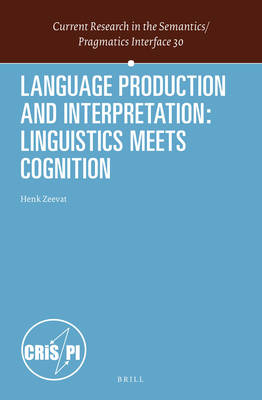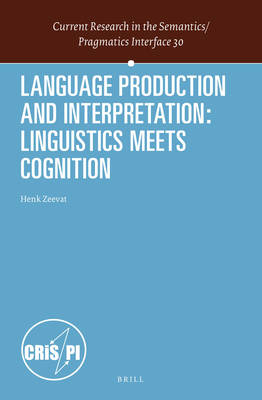
- Afhalen na 1 uur in een winkel met voorraad
- Gratis thuislevering in België vanaf € 30
- Ruim aanbod met 7 miljoen producten
- Afhalen na 1 uur in een winkel met voorraad
- Gratis thuislevering in België vanaf € 30
- Ruim aanbod met 7 miljoen producten
Zoeken
Language Production and Interpretation: Linguistics Meets Cognition
Henk Zeevat
€ 209,45
+ 418 punten
Omschrijving
An utterance is normally produced by a speaker in linear time and the hearer normally correctly identifies the speaker intention in linear time and incrementally. This is hard to understand in a standard competence grammar since languages are highly ambiguous and context-free parsing is not linear. Deterministic utterance generation from intention and n-best Bayesian interpretation, based on the production grammar and the prior probabilities that need to be assumed for other perception do much better. The proposed model uses symbolic grammar and derives symbolic semantic representations, but treats interpretation as just another form of perception. Removing interpretation from grammar is not only empirically motivated, but also makes linguistics a much more feasible enterprise.
The importance of Henk Zeevat's new monograph cannot be overstated. Its combination of breadth, formal rigor, and originality is unparalleled in work on the form-meaning interface in human language...Zeevat's is the first proposal which provides a computationally feasible integrated treatment of production and comprehension for pragmatics, semantics, syntax, and even phonology. I recommend it to anyone who combines interests in language, logic, and computation with a sense of adventure. David Beaver, University of Texas at Austin
The importance of Henk Zeevat's new monograph cannot be overstated. Its combination of breadth, formal rigor, and originality is unparalleled in work on the form-meaning interface in human language...Zeevat's is the first proposal which provides a computationally feasible integrated treatment of production and comprehension for pragmatics, semantics, syntax, and even phonology. I recommend it to anyone who combines interests in language, logic, and computation with a sense of adventure. David Beaver, University of Texas at Austin
Specificaties
Betrokkenen
- Auteur(s):
- Uitgeverij:
Inhoud
- Aantal bladzijden:
- 236
- Taal:
- Engels
- Reeks:
- Reeksnummer:
- nr. 30
Eigenschappen
- Productcode (EAN):
- 9789004252899
- Verschijningsdatum:
- 30/01/2014
- Uitvoering:
- Hardcover
- Formaat:
- Genaaid
- Afmetingen:
- 160 mm x 239 mm
- Gewicht:
- 498 g

Alleen bij Standaard Boekhandel
+ 418 punten op je klantenkaart van Standaard Boekhandel
Beoordelingen
We publiceren alleen reviews die voldoen aan de voorwaarden voor reviews. Bekijk onze voorwaarden voor reviews.








